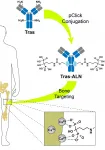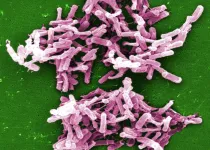Flavored e-cigarettes may affect the brain differently than non-flavored
2021-06-23
(Press-News.org) Flavoring can change how the brain responds to e-cigarette aerosols that contain nicotine, according to Penn State College of Medicine researchers. Andrea Hobkirk and her team used functional magnetic resonance imaging (MRI) to understand how the brain's reward areas react to e-cigarette aerosol with and without flavor.
"There are nearly 12 million e-cigarette users in the United States," Hobkirk, an assistant professor of psychiatry and behavioral health at Penn State College of Medicine, said. "The vast majority use e-cigarettes with menthol, mint, fruity and dessert-type flavors. Although regulations that limit the sale of flavored e-cigarettes may help curb use among youth, they might also stop adults from using e-cigarettes as a smoking reduction or cessation aid. We are trying to understand how flavor influences e-cigarette reward and satisfaction for smokers and the risk of nicotine addiction for non-smokers."
The team first developed a device to deliver e-cigarette aerosols during brain scanning. Next, the research team used this new device to deliver aerosols containing a low dose of nicotine to nine adult female smokers during a single laboratory visit. One aerosol had a strawberry-vanilla flavor, and the other aerosol was flavorless. The team compared the strength of brain activation and reward brain region involvement between flavored and unflavored aerosols.
"For our study, we were interested in looking first at, for smokers, how flavor might affect their response to nicotine e-cigarettes," Hobkirk said. "We recruited smokers who had never used e-cigarettes before or were not regular e-cigarette users. What we were interested in is figuring out whether or not flavor changed how they perceived or how their brain responded to this e-cigarette use."
The researchers found that the strawberry-vanilla aerosol engaged the brain's taste region. In contrast, the unflavored aerosol engaged the brain's reward region, similar to observations during cigarette smoking. The researchers published their results in the journal Experimental and Clinical Psychopharmacology.
The researchers also assessed patterns of neural activity between brain regions. Stronger connectivity between two brain regions typically means that these regions are working together. They found that key brain reward regions were strongly connected with flavored aerosol and not unflavored.
The findings suggest that, for smokers, unflavored e-cigarettes may mimic the typical smoking experience more than flavored e-cigarettes.
"We found that for smokers who had never really used e-cigarettes before, the flavor did not make the experience more rewarding for them, at least in terms of what we saw in the brain," Hobkirk said. "It did not make the experience of breathing in these aerosols more like a smoking experience. Typically, that's what smokers are looking for when they're trying to transition over to a healthier product. They want something that gives all the similar rewarding and sensory-motor effects of their regular combustible cigarette, but without all the harmful effects that come in the toxins of a cigarette. We found that adding flavor doesn't necessarily do that for these smokers, at least what we saw in their response to them in the brain. This could suggest that, potentially, smokers do not necessarily need these flavors to make the transition from a combustible cigarette to an e-cigarette."
INFORMATION:
This project is a pilot study. A more extensive study or clinical trial is needed to explore these findings further. Hobkirk's team will next isolate the independent effects of different flavored e-cigarette aerosols with and without nicotine for smokers and non-smokers.
Hobkirk is a former Penn State Clinical and Translational Science Institute Early-Stage Investigator Training Program(KL2) scholar and a current career development awardee from the National Institute on Drug Abuse (grant K23 DA045081). She is also a member of Penn State Cancer Institute. Penn State Clinical and Translational Science Institute's Bridges to Translation Pilot Grant Program funded this project (grant UL1 TR002014).
To volunteer for Penn State smoking studies, visit research.med.psu.edu/smoking.
A podcast about this research is available here.
Other researchers on the team are Kenneth Houser, Brianna Hoglen, and Dahlia Mukherjee, Department of Psychiatry and Behavioral Health; Jonathan Foulds, Department of Psychiatry and Behavioral Health and Department of Public Health Sciences; Zachary Bitzer, Candace Bordner, Jessica Yingst and Reema Goel, all of Department of Public Health Sciences; Alan Fendrich, Jianli Wang and Prasanna Karunanayaka, all of Department of Radiology; John Richie, Department of Public Health Sciences and Department of Pharmacology; and Qing Yang, Department of Neurosurgery, all of Penn State College of Medicine; and Ryan Elias, Department of Food Science, Penn State College of Agricultural Sciences.
ELSE PRESS RELEASES FROM THIS DATE:
2021-06-23
Researchers from Bentley University have been exploring how readers at partisan news sites respond to news events that challenge their worldview.
In a forthcoming paper in the journal ACM Transactions on Social Computing, they report results of a study that examines reader comments on stories surrounding the 2017 Roy Moore Alabama senate race at two partisan news sites: a left-leaning news site (Daily Kos) and a right-leaning news site (Breitbart). They consider the alleged sexual misconduct of Mr. Moore as a challenging news event for the right-leaning readers; and the subsequent nomination of Mr. Moore as the Republican candidate as a challenging news event for the left-leaning readers.
Their analysis identifies the obstacles that readers face as they try to make sense ...
2021-06-23
NEW YORK CITY, June 23, 2021 -- From amoebas to zebras, all living things evolve. They change over time as pressures from the environment cause individuals with certain traits to become more common in a population while those with other traits become less common.
Cancer is no different. Within a growing tumor, cancer cells with the best ability to compete for resources and withstand environmental stressors will come to dominate in frequency. It's "survival of the fittest" on a microscopic scale.
But fitness -- how well suited any particular individual is to its environment -- isn't set in stone; it can change when the environment changes. The cancer cells that might do best in an environment saturated ...
2021-06-23
SAN FRANCISCO, CA--June 23, 2021--A healthy heart is a pliable, ever-moving organ. But under stress--from injury, cardiovascular disease, or aging--the heart thickens and stiffens in a process known as fibrosis, which involves diffuse scar-like tissue. Slowing or stopping fibrosis to treat and prevent heart failure has long been a goal of cardiologists.
Now, researchers at Gladstone Institutes have discovered a master switch for fibrosis in the heart. When the heart is under stress, they found, the gene MEOX1 is turned on in cells called fibroblasts, spurring fibrosis. Their new study, published in the journal Nature, suggests that blocking ...
2021-06-23
HOUSTON - (June 23, 2021) - Bone cancer is hard to treat and prone to metastasis. Research teams at Rice University and Baylor College of Medicine have a new strategy to attack it.
Chemist Han Xiao at Rice and biologist Xiang Zhang at Baylor and their labs have developed an antibody conjugate called BonTarg that delivers drugs to bone tumors and inhibits metastasis.
Their open-access study, which appears in Science Advances, shows how Xiao's pClick technology can be used to link bone-targeting antibodies and therapeutic molecules.
In experiments, they used pClick to couple a molecule used to treat osteoporosis, alendronate, with the HER2-targeting antibody trastuzumab used to treat breast cancer and found it significantly enhanced the concentration ...
2021-06-23
Most survivors of squamous cell head and neck cancers report that their sense of taste is dulled, changed or lost during radiation treatment, causing them to lose interest in eating and diminishing their quality of life.
In a study of taste and smell dysfunction with 40 cancer survivors, scientists at the University of Illinois Urbana-Champaign found that the tips of these individuals' tongues were significantly less sensitive to bitter, salty or sweet tastes than peers in the control group who had never been diagnosed with cancer.
In a paper published in the journal Chemical Senses, the U. of I. team said this diminished taste sensitivity suggested that the taste ...
2021-06-23
In New England, constraints in the supply of natural gas have led to nearly a quarter of all unscheduled power plant outages. In a new study, researchers used data from power plant failures in the 2010s to develop a supply curve of the costs required for generators to mitigate fuel shortages in the region. The study found that storing both oil and gas on-site could reduce dependence by power plants on gas grids in geographic areas with few pipelines.
The study was conducted by researchers at Carnegie Mellon University (CMU), The Pennsylvania State University, and the North American Electric Reliability Corporation. It is published in The Electricity Journal.
"Gas ...
2021-06-23
Toronto - Last winter, Goldman Sachs reported it was working to make things better after a group of junior analysts revolted against 100-hour work weeks.
That's a smart thing to do, suggests a new study from the University of Toronto's Rotman School of Management. Drawing from more than 6,000 employee reviews of their workplaces and data on their firms' forecasting accuracy, the research shows that making improvements to hardworking analysts' work-life balance produces dividends for the company and for the analysts' careers.
"There is a lot of anecdotal evidence, but here we provide large-scale evidence that supports the recent push to grant these employees at least some reprieve from the extremes of their jobs," said Ole-Kristian Hope, who is the Deloitte Professor of Accounting ...
2021-06-23
The Gerontological Society of America's highly cited, peer-reviewed journals are continuing to publish scientific articles on COVID-19. The following were published between May 4 and June 14; all are free to access: Cardiometabolic therapy and mortality in very old patients with diabetes hospitalized due to COVID-19: Research article in The Journals of Gerontology, Series A: Biological Sciences and Medical Sciences by Jose Manuel Ramos-Rincón, MD, PhD, Luis M. Pérez-Belmonte, MD, PhD, Francisco Javier Carrasco-Sánchez, MD, PhD, Sergio Jansen-Chaparro, MD, PhD, Mercedes De-Sousa-Baena, MD, José Bueno-Fonseca, MD, ...
2021-06-23
Best known for its presence in house cats and a tendency to infect and alter the behaviors of rodents and humans, the parasite Toxoplasma gondii (T. gondii) is also associated with bold behavior among wild hyena cubs and risk of death during interactions with lions, finds new research from the University of Colorado Boulder.
The findings, published this week in Nature Communications, reinforce previous research which has found the parasite can prompt profound behavioral changes in its hosts, and potentially in the 2 billion people worldwide estimated to be infected by it. While T. gondii has been well studied in laboratory settings with humans and wild-caught ...
2021-06-23
Researchers from Charité - Universitätsmedizin Berlin and the University of California in San Francisco were able to show for the first time that a very low calorie diet significantly alters the composition of the microbiota present in the human gut. In a current Nature* publication, the researchers report that dieting results in an increase of specific bacteria - notably Clostridioides difficile, which is associated with antibiotic-induced diarrhea and colitis. These bacteria apparently affect the body's energy balance by exerting an influence on the absorption of nutrients ...
LAST 30 PRESS RELEASES:
[Press-News.org] Flavored e-cigarettes may affect the brain differently than non-flavored





